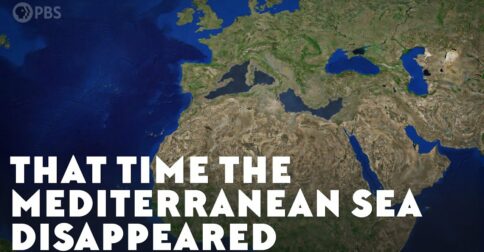
We hear a great deal today about the potential causes of rising sea levels. At a certain point, natural curiosity brings out the opposite question: what causes sea levels to fall? And for that matter, can a body of water so large simply vanish entirely? Such a thing did happen once, according to the PBS Eons video above. The story begins, from our perspective, with the discovery about a decade ago of a giant rabbit — or rather of the bones of a giant rabbit, one “up to six times heavier than your average cottontail” that “almost certainly couldn’t hop.” This odd, long-gone specimen was dubbed Nuralagus rex: “the rabbit king of Minorca,” the modern-day island it ruled from about five million to three million years ago.
After living for long periods of time on islands without natural predators, certain species take on unusual proportions. “But how did the normal-size ancestor of Nuralagus make it onto a Mediterranean island in the first place?” The answer is that Minorca wasn’t always an island. In fact, “mega-deposits” of salt under the floor of the Mediterranean suggest that, “at one point in history, the Mediterranean Sea must have evaporated.” As often in our investigation of the natural world, one strange big question leads to another even stranger and bigger one. Geologists’ long and complex project of addressing it has led them to posit a forbidding-sounding event called the Messinian Salinity Crisis, or MSC.
MSC-explaining theories include a “global cooling event” six million years ago whose creation of glaciers would have reduced the flow of water into the Mediterranean, and “tectonic events” that could have blocked off what we now know as the Strait of Gibraltar. But the cause now best supported by evidence involves a combination of shifts in the Earth’s crust and changes in its climate — sixteen full cycles of them. “During periods of decreasing sea level, the position and angle of the Earth changed with respect to the Sun, so there were periods of lower solar energy, and others of higher solar energy, which increased evaporation rates in the Mediterranean. At the same time, an actively folding and uplifting tectonic belt caused water input to decrease.”
The MSC seems to have lasted for over 600,000 years. At its driest point, 5.6 million years ago, “external water sources were completely cut off, and most of the water left behind in the Mediterranean basin was evaporating.” For sea creatures, the Mediterranean became uninhabitable, but those that lived on dry land had a bit of a field day. These relatively dry conditions “allowed hippos, elephants, and other megafauna from Africa to walk and swim across the Mediterranean,” constituting a great migration that would have included the ancestor of Nuralagus rex. But when the sea later filled back up — possibly due to a flood, as animated above — the rabbit king of Minorca learned that, even on a geological timescale, you can’t go home again.
Related content:
Global Warming: A Free Course from UChicago Explains Climate Change
How Humans Domesticated Cats (Twice)
Based in Seoul, Colin Marshall writes and broadcasts on cities, language, and culture. His projects include the Substack newsletter Books on Cities, the book The Stateless City: a Walk through 21st-Century Los Angeles and the video series The City in Cinema. Follow him on Twitter at @colinmarshall or on Facebook.
from Open Culture https://www.openculture.com/2022/02/that-time-when-the-mediterranean-sea-dried-up-disappeared.html
via Ilumina

Comments
Post a Comment